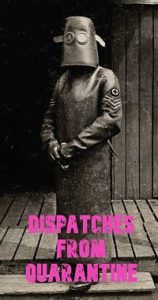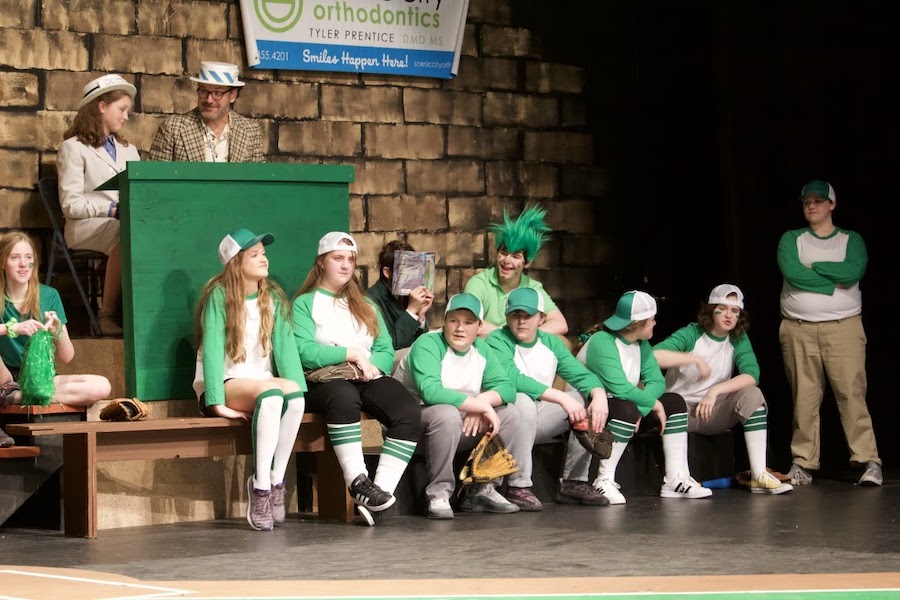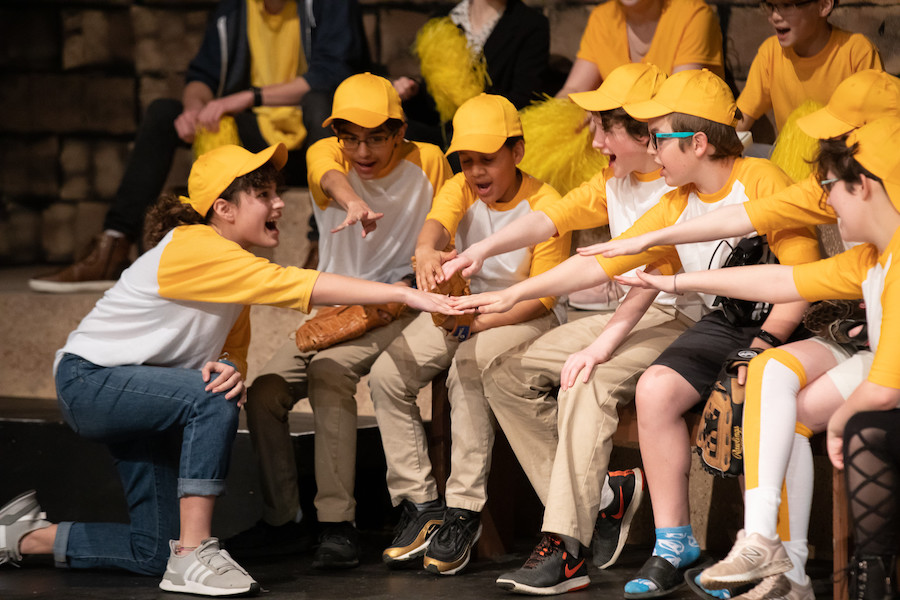 As Jason Tinney and I wrote the original script Let ‘Em Play! for our middle school students, we thought we were clever by intertwining the then-present theme of a potential threat to minor league baseball and the impact that could have on communities across smaller towns. This was on Jan. 1. All things seemed possible, even saving minor league baseball through a middle school production at a private school in Chattanooga, Tenn.—home of the minor league team the Chattanooga Lookouts. We wrote lines in the play to reflect as much, like, “We have bigger problems than a stupid rivalry,” “Well folks, what a wild week in sports!” A sports broadcaster character announces joy in the fact that our theatrical ball team gets to play one more game “as we stand on the precipice of history.” She follows that intentionally overdramatic line with, “Too much?”
As Jason Tinney and I wrote the original script Let ‘Em Play! for our middle school students, we thought we were clever by intertwining the then-present theme of a potential threat to minor league baseball and the impact that could have on communities across smaller towns. This was on Jan. 1. All things seemed possible, even saving minor league baseball through a middle school production at a private school in Chattanooga, Tenn.—home of the minor league team the Chattanooga Lookouts. We wrote lines in the play to reflect as much, like, “We have bigger problems than a stupid rivalry,” “Well folks, what a wild week in sports!” A sports broadcaster character announces joy in the fact that our theatrical ball team gets to play one more game “as we stand on the precipice of history.” She follows that intentionally overdramatic line with, “Too much?”
None of us could have anticipated the new coronavirus pandemic, nor the ways in which this global health crisis would impact us on a micro, personal level— particularly for young, aspiring theatre kids. “Theatre kids,” as they call themselves, have already learned by middle school that sports and athletics rule the school. They already appreciate a sense that drama and performing arts take a back seat. That we get wedged in between football and basketball and swimming and wrestling and golf and soccer and baseball calendars. We, as directors of young adults, do the best we can to pump them up and dispel any such notions that we play eighth fiddle in extracurriculars—but we are empathetic to the ways of the world they are absorbing. So on one level, we’d written them a spring play about rival baseball teams so they could have a weekend to experience being the center of well-deserved attention.
As we began rehearsals in mid-January, typical production hiccups came, and we managed. Everyone in theatre can nod along about what it takes to coordinate lighting, sound, projection, and actors. Everyone in children’s theatre can also nod along about what it takes to corral and inspire 25-plus kids volunteering for an after-school activity to make regular attendance, memorize lines and blocking, and to avoid playing with (and breaking) props before show time. And whether we are directors or parents of our theatre kids, we know their emotional intelligence scores extremely high, and it’s our responsibility to take that into account when we have to deliver bad news—like delivering news in dressing rooms 20 minutes to places on the night of an invited dress rehearsal that their rehearsal will now be the show because opening night and subsequent shows are cancelled due to COVID-19.
Let me be clear: Emotional intelligence in no way indicates a weakness or an inability to handle reality. I would argue that people who are emotionally in tune with their environment and the world are tougher than nails. They—we—understand things on such a deep, interconnected level that, depending on the circumstances, can make us experience joy or heartbreak greater than the norm. That’s what makes us theatre kids. And that’s what instills in us the rallying spirit that the show must go on.
On Thursday, March 12, our student cast and parent volunteers trickled in to get ready for the evening’s invited dress rehearsal performance, which became opening and closing night all in one. Spirits were high, even while contending with second-by-second news that at any minute, Tennessee’s declaration of a state of emergency would halt our immediate world, the culmination of three months work, and the reward we all get paid in: audience and applause. About an hour before calling places I was notified that our campus was closing and all activities were being cancelled. We could still run the dress rehearsal, but that would be all for now.
Certainly we want to protect the health and safety of our students. That is our aim every day of rehearsals and supersedes all objectives in putting on a play. And to be fair, theatre superstitions had already cursed this production. The play was set to open on Friday the 13th, after all. And another theatre class was studying Macbeth in the theatre, so that unutterable theatre word was probably uttered a hundred times in the last place it should ever be uttered.
But on the human level, the level we work in on a daily basis, the kids were crushed when I had the unfortunate responsibility of telling them the shows were cancelled. I too am a theatre kid and I wanted to bawl my eyes out. Not just for me, and not just for my co-writer and co-director, but for our kids. I shared the news with the parent volunteers first. As they donned the plastic gloves we’d purchased to dish out popcorn and sodas, I broke the news. They went into action calling everyone they knew to get them to the dress rehearsal. I ran up to the tech booth to let them know we were holding to make sure all of the local parents and family could drive over.

And then I had to face the kids, the boys in their dressing room and then the girls in their dressing room. “Play your hearts out tonight! Play like this is the last time you’ll get to play! Throw everything you’ve got into tonight because…” And then, understanding kids that they are, one asked, “This is the last time, isn’t it?” I’ll admit that I was heartbroken for these kids and tears escaped my eyes. “Can I get my phone to call my mom? She was coming on Friday,” one of the cast members cried as she digested the reality. Another got on the phone with his dad: “It’s now or never, get here,” he said.
Many lights shone on this emotional scramble. Within 20 minutes of learning about the cancellation, we had an audience for our dress rehearsal. In a 200-seat black box theatre, nearly 100 friends and family members mobilized as a community at the last minute to come out and support our kids. High school theatre students grabbed filming equipment to record the show. Our cast of sixth-, seventh-, and eighth-graders dried their tears and reapplied makeup. They came onstage like real pros and hit line drives out of the park with their performances.
We all stuck around afterward to hug and elbow-pump—whatever we needed to do to connect together on the night we experienced that maybe no one else can ever fully understand. No one wanted to go home. No one wanted to say goodbye.
There was an eerie moment after the last kid had left. We’d thrown all the costumes and props into the girls’ dressing room. “I forgot to lock the dressing room,” I remembered as we were walking out. “It’s fine. No one’s coming to the theatre.”
The irony is that the conflict of Let ‘Em Play! centers around developers trying to eliminate outdoor parks to stack hundreds of people on top of each other in condo complexes. The two rival baseball teams unite over this mutual threat to their passion— playing outside together—and defeat the developers with the rallying cry, “Let us play! Let us play!”
For now, we are all taking the appropriate steps to combat the spread of COVID-19. There is also, though, an aspect that all of us in theatre are well aware of. We write, direct, and act in plays because theatre is our medium for presenting truths. If the ending of our play can become the beginning—kids delivering powerful the lesson that we can come together to overcome big obstacles—that is an optimistic outcome we can all root for.
We hope that all of us from Broadway to the little leagues of theatre will have a “let ’em play” opportunity when the dust settles. The show must go on.
Holly Morse-Ellington is a playwright and essayist. She received the Individual Artist Award in Playwriting from the Maryland State Arts Council in 2018 and was nominated for a Pushcart Prize for her creative nonfiction in 2018. She is a writer for Flea Market Insiders, CityScope, and HealthScope magazines.


